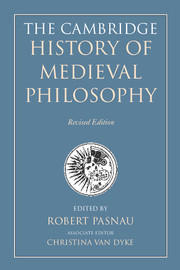Book contents
- Frontmatter
- Contents of Volume 1
- Preface
- List of contributors
- Frontmatter
- Contents of Volume 2
- Introduction
- I Fundamentals
- II Logic and language
- III Natural philosophy
- IV Soul and knowledge
- V Will and desire
- VI Ethics
- VII Political philosophy
- 39 Religious authority and the state
- 40 Individual autonomy
- 41 Law and nature
- 42 Poverty
- 43 Just war
- VIII Metaphysics
- IX Theology
- Appendices
- Bibliography of primary sources
- Bibliography of secondary sources
- Index nominum
- Index rerum
- References
43 - Just war
from VII - Political philosophy
Published online by Cambridge University Press: 05 August 2014
- Frontmatter
- Contents of Volume 1
- Preface
- List of contributors
- Frontmatter
- Contents of Volume 2
- Introduction
- I Fundamentals
- II Logic and language
- III Natural philosophy
- IV Soul and knowledge
- V Will and desire
- VI Ethics
- VII Political philosophy
- 39 Religious authority and the state
- 40 Individual autonomy
- 41 Law and nature
- 42 Poverty
- 43 Just war
- VIII Metaphysics
- IX Theology
- Appendices
- Bibliography of primary sources
- Bibliography of secondary sources
- Index nominum
- Index rerum
- References
Summary
Just war theories of any age have the difficult dual purposes of restraining and justifying violence. Augustine’s thought, crucial for medieval Christian theory, reflected both purposes, but was casual and unsystematic. Medieval (and later) thinkers in the Latin West tried to give his scattered comments a specious doctrinal precision, packaging and repackaging the few familiar Augustinian phrases in ways that make it difficult to determine when a real shift in thought has occurred. For instance, the basic Augustinian criteria for just war were just cause, proper authority, and right intention, but agreement on these superficial generalities often masked real differences of medieval opinion.
Medieval theorizing was made more complex by the fact that warfare was not clearly distinguished from other forms of legitimate violence. Moreover, the sovereign state was supplanted by the decentralized lordships of feudalism, whereby every feudal lord had the right to use violence in his own defense. It was only when sovereign states with their monopoly of legitimate violence reappeared in the thirteenth century that something like Augustine’s idea of the just war could reemerge. The internal tensions in this theory between a suspicion of all physical violence and its ardent support are best seen in the halting justification of the Crusades. Churchmen were leery of involving the church too directly in bloodshed, and yet they championed the Crusades. That they had no term to approximate ‘Crusade’ indicates their reticence, however, and so they had trouble including the Crusades within their rubric of just war. This is just one indication that the best minds of the Middle Ages did not devote sustained and systematic reflection to the problems of warfare. Even so, their views have had a lasting impact on modern thinking about the topic.
- Type
- Chapter
- Information
- The Cambridge History of Medieval Philosophy , pp. 593 - 606Publisher: Cambridge University PressPrint publication year: 2014
References
- 1
- Cited by



